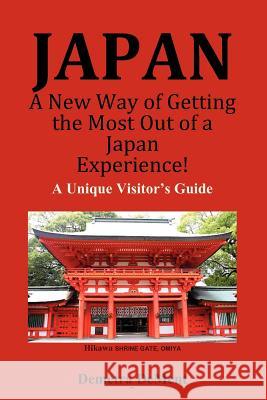JAPAN A New Way of Getting the Most Out of a Japan Experience!: A Unique Visitor's Guide » książka
JAPAN A New Way of Getting the Most Out of a Japan Experience!: A Unique Visitor's Guide
ISBN-13: 9781480266667 / Angielski / Miękka / 2012 / 182 str.
A Different Way of Viewing and Doing Japan Most people who visit Japan as tourists are kept on a pre-set course that takes them to and by a variety of attractions, limiting their experiences to a small sampling of the diversity and richness that make up the essence of life in Japan. The depth and breadth of the whole Japan experience is, in fact, incredible and cannot be packaged into several days or even several weeks. However, even visitors who are bound by time constraints and well-beaten tours can enliven and enrich their experiences by participating in at least a few unique customs and practices. This ranges from visiting areas in Tokyo and elsewhere that have retained the look and flavor of Japan's feudal shogunate era, to spending time in one or more of the remaining castles that were the homes and fortresses of fief clan lords from the 1600s to 1870. This book gets down to the nitty-gritty on the frame of mind you need to have for a rewarding visit-or stay-in Japan; on what you should know before you get there; on the effect seasons will have on your visit; on the background of Japan's cultural attractions; and on off-beat things that regular tourist itineraries do not cover. These insights and information add a special dimension to the Japan experience even if it is just for a few days. The book also includes selected Japanese language vocabulary and common everyday expressions that will add a fourth dimension to your visit. All of these words and expressions are rendered in Romanized letters and in English phonetics that duplicate their Japanese pronunciation, meaning that when you speak or read the phonetics out loud the sounds come out "in Japanese " Here are some examples: Good Morning Ohayo-gozaimasu Oh-hah-yoe-go-zie-mahss] Used from early morning until about 10am when you are meeting an individual for the first time that morning. Hello / good day, good afternoon Konnichi wa Kone-nee-chee wah] Used from about 10am until dusk or just before. Good Evening Komban wa Kome-bahn wah] Used from the onset of dusk until midnight. What is your name? Onamae wa nan desu ka? Oh-nah-my wah nahn dess kah? How are you? Ikaga desu ka? Ee-kah-gah dess kah?] I'm fine Genki desu Gane-kee dess] Being able to say a number of key things in Japanese will totally change the flavor of your visit. You can easily memorize the simpler greetings and expressions in advance.
Zawartość książki może nie spełniać oczekiwań – reklamacje nie obejmują treści, która mogła nie być redakcyjnie ani merytorycznie opracowana.











